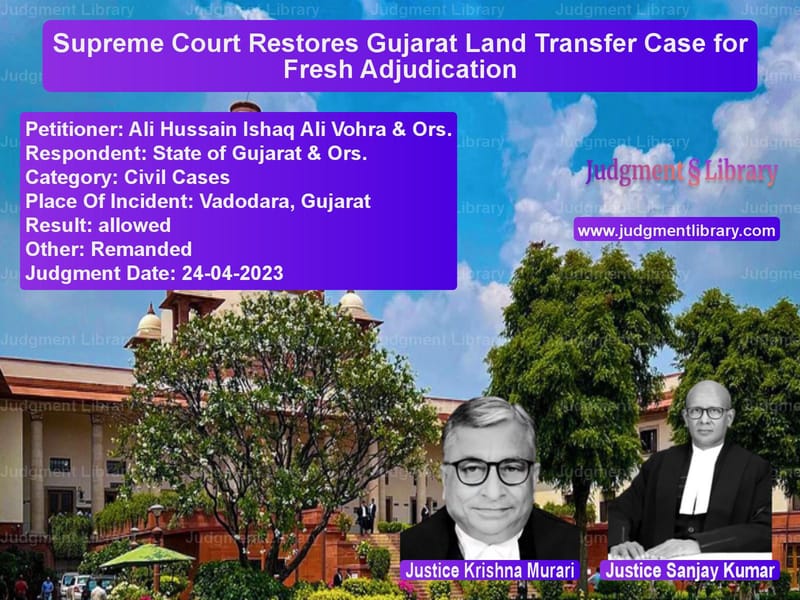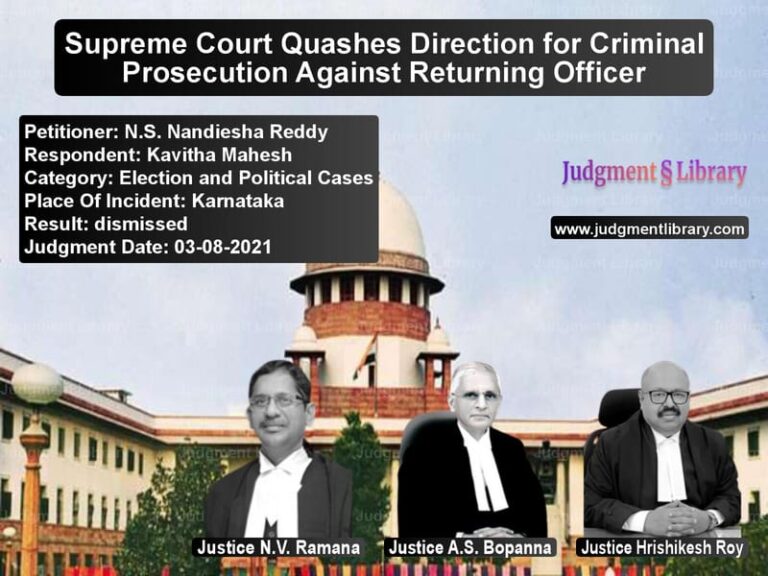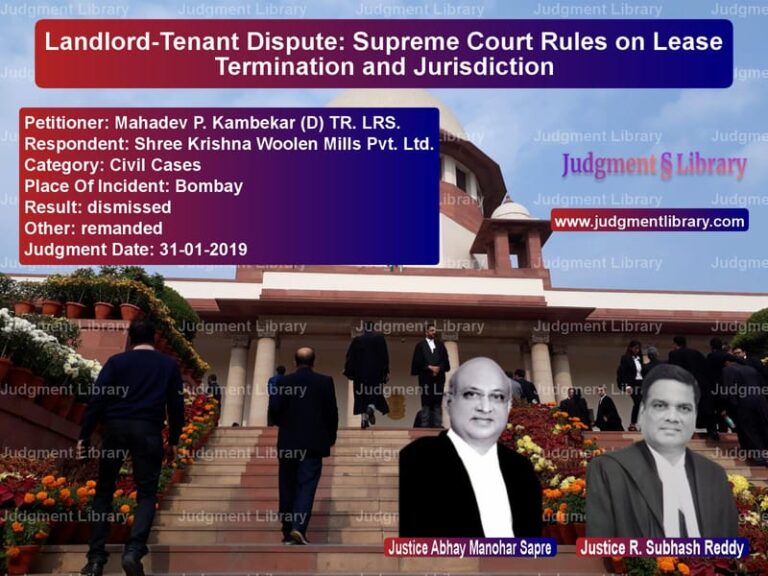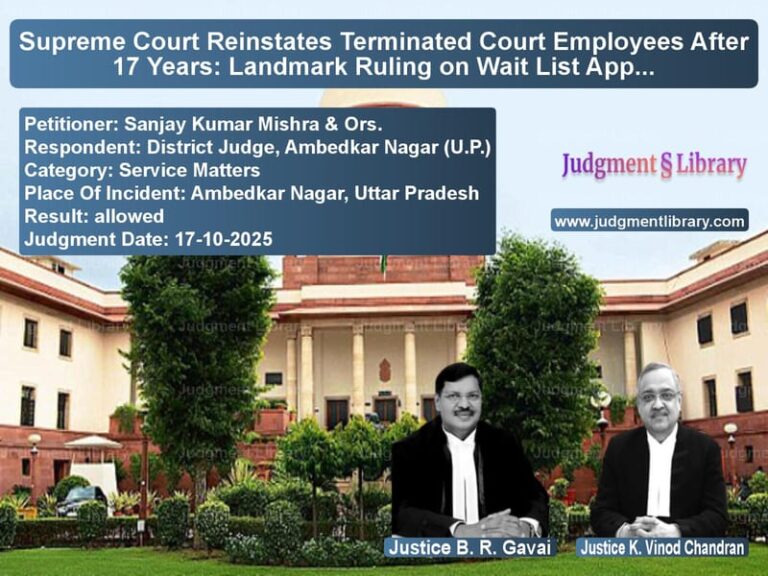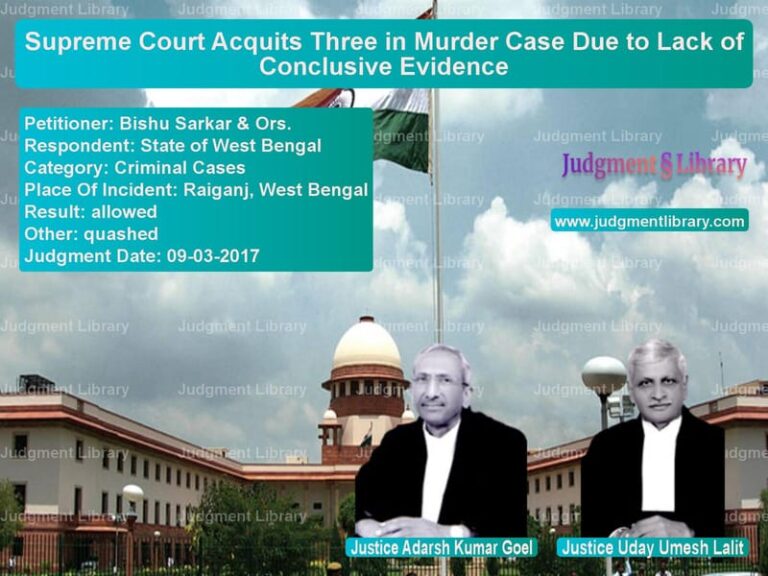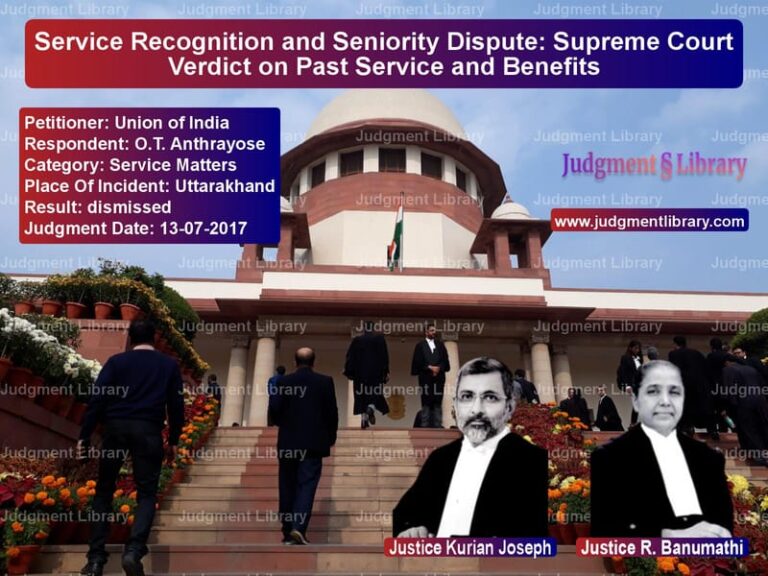Supreme Court Restores Gujarat Land Transfer Case for Fresh Adjudication
The Supreme Court of India, in the case of Ali Hussain Ishaq Ali Vohra & Ors. vs. State of Gujarat & Ors., ruled in favor of the petitioners by restoring their land-related case for fresh adjudication before the Gujarat High Court. The appeal challenged the Gujarat High Court’s decision, which dismissed their writ petition on procedural grounds. The Supreme Court emphasized that procedural technicalities should not obstruct the administration of justice when the petitioners had clearly indicated their intent to seek fresh legal recourse.
The ruling highlights the importance of addressing substantive issues rather than dismissing cases based on mere procedural lapses. The Supreme Court noted that the High Court overlooked the petitioners’ explicit request for liberty to approach the court again if necessary.
Background of the Case
The appellants originally filed Special Civil Application No. 4865 of 2020 before the Gujarat High Court, challenging the constitutional validity of the Gujarat Prohibition of Transfer of Immovable Property and Provision for Protection of Tenants from Eviction from Premises in Disturbed Areas Act, 1991 (commonly referred to as the Disturbed Areas Act). They also sought to quash a notification issued under this law and a decision by the Collector of Vadodara, which denied them permission to transfer the property.
Subsequently, the appellants filed an application seeking to withdraw their petition, stating that they had transferred their rights in favor of a third party, Jigneshbhai Dhuman, a Hindu individual. Since the Disturbed Areas Act applied primarily to inter-community property transactions, they believed that their case had become irrelevant and requested to withdraw their petition. However, they specifically included the following prayer:
“On account of this development, the provisions of the impugned statute do not apply to the petitioners, and therefore, the petitioners seek to withdraw the petition with a liberty to approach this Hon’ble Court again if need so arises.”
The Gujarat High Court granted the withdrawal on June 17, 2021, but the order did not explicitly mention the liberty to refile the case. When the arrangement with Jigneshbhai Dhuman did not materialize, the appellants had to approach the High Court again by filing Special Civil Application No. 15098 of 2022, raising the same legal issues.
Key Legal Issues
1. Whether the Gujarat High Court erred in dismissing the petitioners’ second writ petition on the ground that they had not obtained express leave to refile.
2. Whether the absence of explicit liberty in the withdrawal order of the first writ petition barred the petitioners from seeking fresh relief.
3. Whether the principle of substantial justice should override procedural technicalities in this case.
Arguments Presented
Petitioners (Ali Hussain Ishaq Ali Vohra & Ors.) Arguments
- The Gujarat High Court failed to consider that their original withdrawal request included a specific plea to refile the case if necessary.
- The withdrawal of the earlier writ petition was based on changed circumstances that later did not materialize, making it necessary to approach the court again.
- The dismissal of their second petition on procedural grounds denied them an opportunity to be heard on merits.
- The High Court should have focused on the substantive legal issues instead of barring them from seeking relief due to a procedural technicality.
Respondents (State of Gujarat) Arguments
- The petitioners voluntarily withdrew their previous case without explicitly securing leave to refile it.
- The dismissal of the first writ petition was unqualified, making the second petition on the same subject matter unsustainable.
- Judicial discipline requires that parties cannot repeatedly litigate the same issue without express leave of the court.
Supreme Court’s Observations
The Supreme Court, led by Justices Krishna Murari and Sanjay Kumar, made the following key observations:
- The Gujarat High Court failed to consider the petitioners’ request for liberty to refile, which was included in their withdrawal application.
- The absence of explicit mention of such liberty in the withdrawal order does not necessarily indicate that it was denied by the High Court.
- Procedural technicalities should not become a tool for obstructing the administration of justice, especially when there was no deliberate attempt by the petitioners to abuse the judicial process.
- The petitioners had a legitimate right to seek relief and should not be barred due to an omission in the withdrawal order.
The Court stated:
“The mere absence of the mention of such liberty in the dismissal order dated 17.06.2021 cannot be taken to be a refusal of such prayer by the High Court upon application of mind. There is no indication to that effect in the order itself.”
Final Judgment
The Supreme Court ruled as follows:
- The Gujarat High Court’s order dated September 19, 2022, was set aside.
- Special Civil Application No. 15098 of 2022 was restored to the Gujarat High Court’s docket.
- The case would now be adjudicated on its merits.
Implications of the Judgment
The ruling has significant implications for future cases involving procedural lapses:
- Substantive justice takes precedence over technicalities: Courts should focus on ensuring justice rather than dismissing cases on minor procedural grounds.
- Withdrawal of cases should be explicit: If parties intend to refile a case later, they must ensure that the withdrawal order expressly grants liberty to do so.
- Encouragement of fair litigation: The judgment discourages rigid procedural barriers that may prevent genuine claims from being heard.
Conclusion
The Supreme Court’s ruling in Ali Hussain Ishaq Ali Vohra & Ors. vs. State of Gujarat & Ors. ensures that procedural formalities do not become an impediment to justice. By restoring the petitioners’ case, the Court reaffirmed that genuine legal grievances should be adjudicated on merits rather than dismissed on technical grounds.
This decision sets a significant precedent for future litigants, reinforcing the principle that courts must prioritize fair adjudication over rigid adherence to procedural norms.
Petitioner Name: Ali Hussain Ishaq Ali Vohra & Ors..Respondent Name: State of Gujarat & Ors..Judgment By: Justice Krishna Murari, Justice Sanjay Kumar.Place Of Incident: Vadodara, Gujarat.Judgment Date: 24-04-2023.
Don’t miss out on the full details! Download the complete judgment in PDF format below and gain valuable insights instantly!
Download Judgment: ali-hussain-ishaq-al-vs-state-of-gujarat-&-o-supreme-court-of-india-judgment-dated-24-04-2023.pdf
Directly Download Judgment: Directly download this Judgment
See all petitions in Property Disputes
See all petitions in Contract Disputes
See all petitions in Landlord-Tenant Disputes
See all petitions in Judgment by Krishna Murari
See all petitions in Judgment by Sanjay Kumar
See all petitions in allowed
See all petitions in Remanded
See all petitions in supreme court of India judgments April 2023
See all petitions in 2023 judgments
See all posts in Civil Cases Category
See all allowed petitions in Civil Cases Category
See all Dismissed petitions in Civil Cases Category
See all partially allowed petitions in Civil Cases Category

